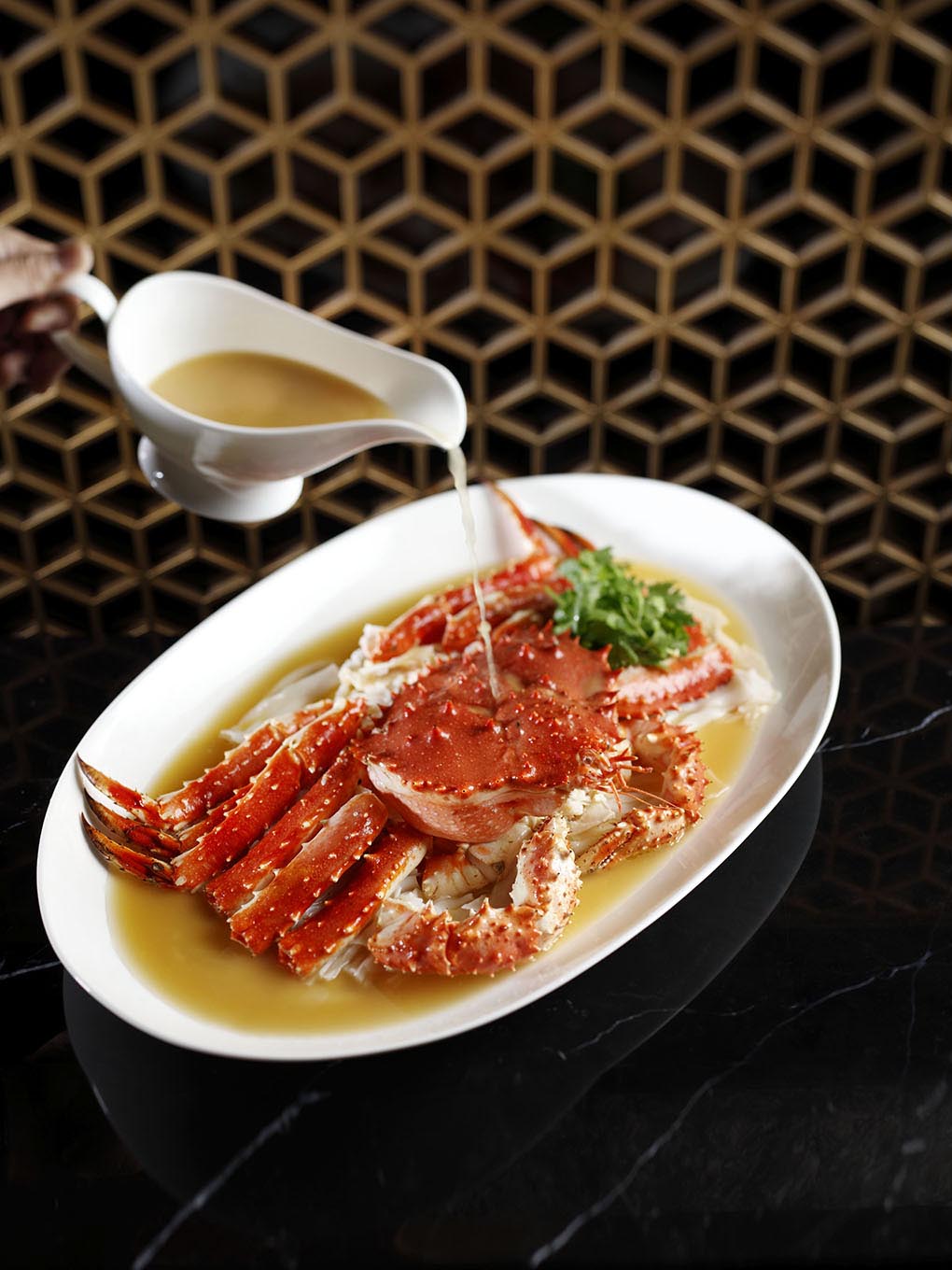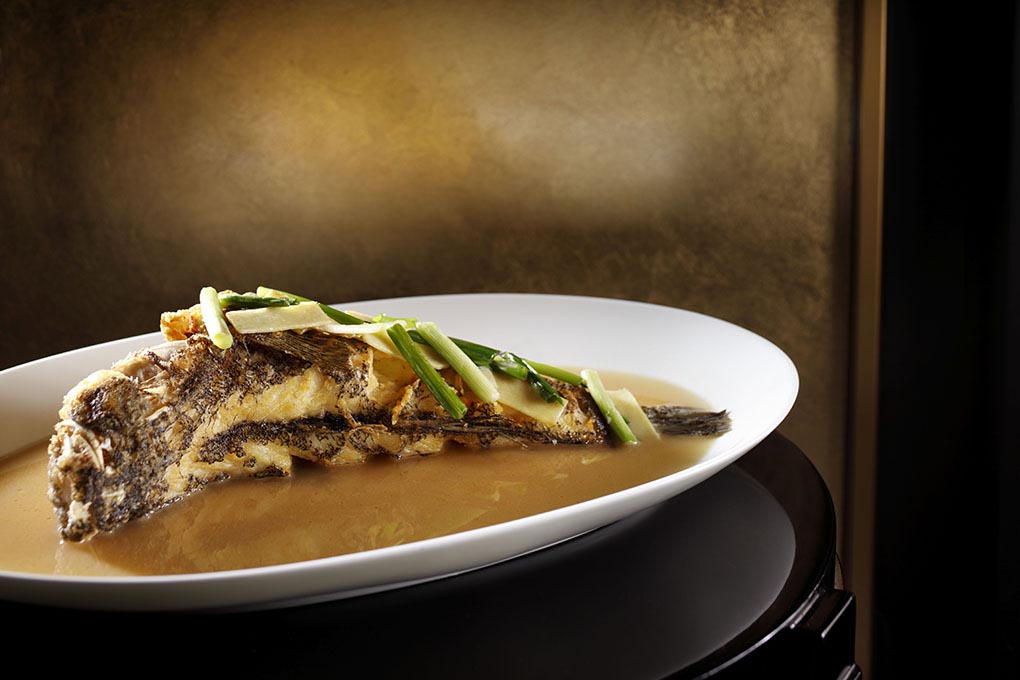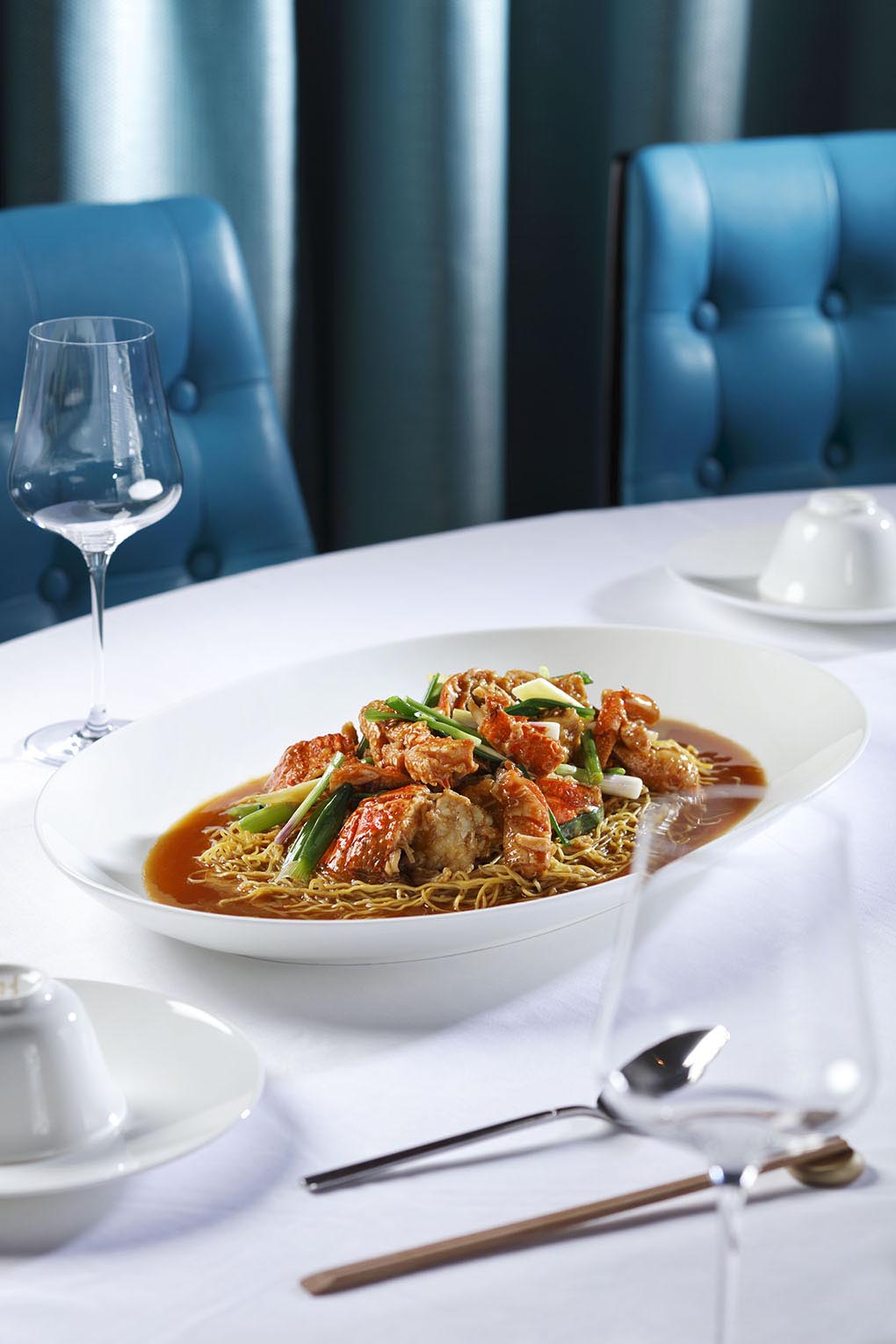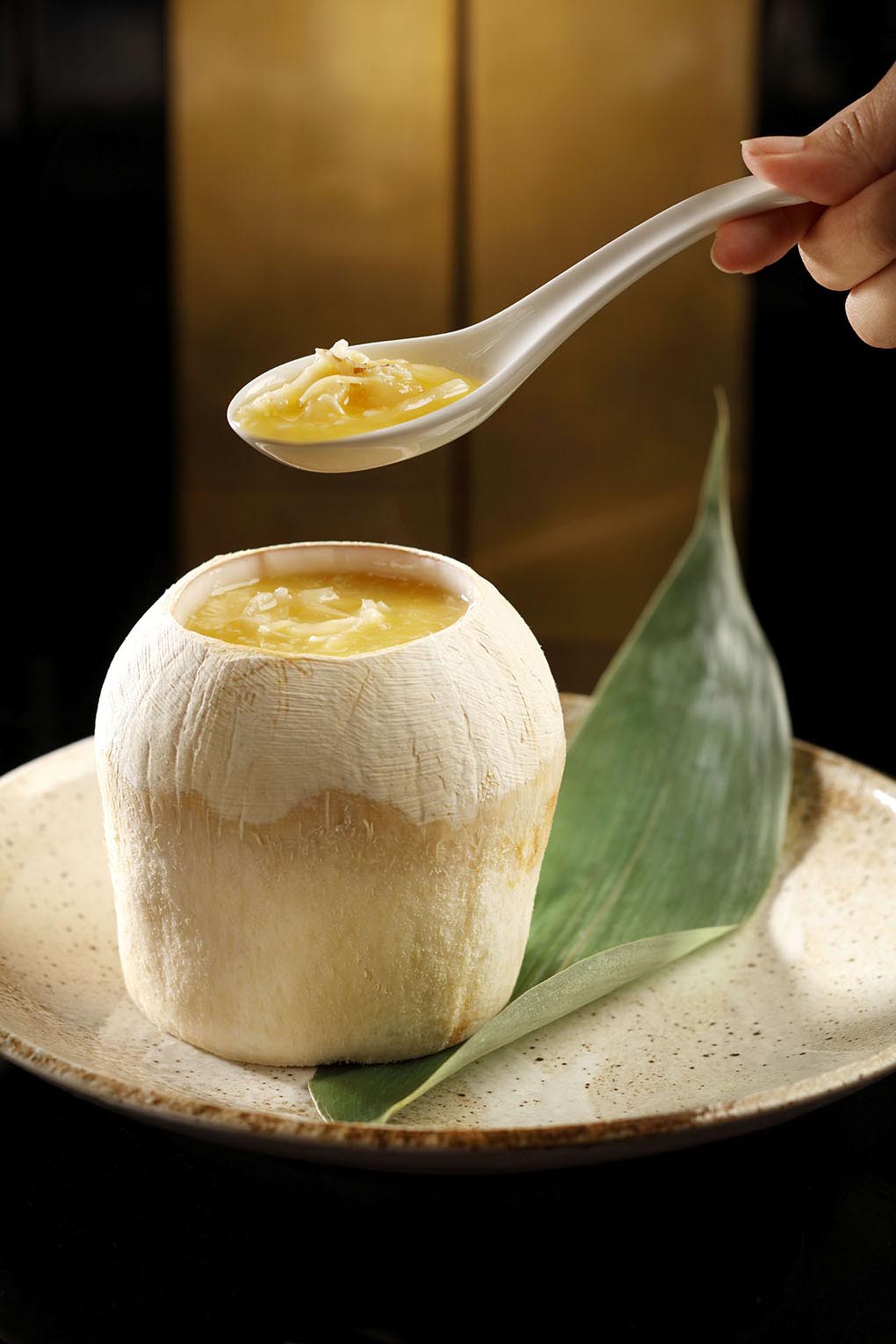Alan Yau Lands On Singapore's Shores
by Reuben Oh
@ 27 Jul 2018

He’s the award-winning owner of several restaurants across the globe, and widely regarded as the man who brought good Asian food to the United Kingdom market. Meet Alan Yau
(AY), restaurateur, entrepreneur - the creative mastermind with a golden touch. With many accolades under his name, including the one-Michelin -starred Hakkasan and Yauatcha, you’d think he’d be done and dusted with the restaurant business. He’s not: just a few months ago, he opened his first restaurant in Singapore (and by extension, the entire South East Asia), Madame Fan (Refer to page xxxx) . It’s a ‘theatrical dining concept’ serving Cantonese cuisine with his signature flair. Amid the elaborate interior of Madame Fan, I take a seat with this restaurateur giant to ask him pertinent questions on his past, his present, and his very curious future.
 Madame Fan - Drunken Crab Rice Noodle
What are you bringing to the Cantonese dining scene in Singapore that is different from the rest?
AY:
Madame Fan - Drunken Crab Rice Noodle
What are you bringing to the Cantonese dining scene in Singapore that is different from the rest?
AY: In my career I’ve never worried about being different: being different means that you’re seeking that no one else is doing, but that doesn’t necessarily mean that your product is better. If I can create a product that is better than the rest, then it doesn’t really matter if the scene is competitive. Being better is better than being different.
On this point, one thing I’ve noticed is that the Cantonese offering in Singapore is not authentic. I think the usual suspects are very average, very generic. The only restaurant that impresses me the most in terms of the level of quality in taste and acquisition is the Cantonese restaurant at the Four Seasons Hotel (Jiang-Nan Chun). Over the years, they’ve shifted to a more modern stance but whilst keeping a good level of authenticity. In terms of culinary craft, there are three or four items from Jiang-Nan Chun that are truly staggering.
Madame Fan itself has an old-school concept – I personally enjoy using very old school dishes and reinventing them but keeping the taste profile truly authentic. At the same time, of course, I bring a bit of London into the mix for some fun.
I heard from Chef Mike Tan (Head Chef at Madame Fan) that when you set up shop in a new country, you bring your previous signatures over and try to re-tweak them to the local palate. Has there been a specific local palate that has been especially difficult to appeal to?
AY: I think its not so much the challenge of adaptation. In all cities it’s really more about the challenge of the supply chain. For example, Peking duck has been particularly hard to realise in Europe. There are two ways to pluck the feathers from a duck - either using hot water or wax. The processes over in Europe generally don’t allow you to prepare the duck skin in a way that makes it crispy and smooth when cooked.
 Madame Fan - Steamed Soon Hock with Ipoh Soy and Spring Onion
I’ve noticed that you’ve founded a lot of successful restaurants, but you seem to have a pattern of passing on the reins after a few years. Is this a particular working style you have?
AY:
Madame Fan - Steamed Soon Hock with Ipoh Soy and Spring Onion
I’ve noticed that you’ve founded a lot of successful restaurants, but you seem to have a pattern of passing on the reins after a few years. Is this a particular working style you have?
AY: Looking at my career, there’s definitely a pattern: in some ways it’s like looking at a bad CV (chuckles). I wish I stuck with one project and tried to mature the baby for say ten, 15 years. I think that as a business model that’s the only way you can truly make proper money. I truly wish there was a way I could grow concepts organically one at a time without giving away equity.
Despite all this, especially when you’re younger, I think that it is great for a creative person to incubate new start-ups for a few years at a time. It’s definitely more exciting than babysitting something from infancy to maturity.
A specific gift I have within the industry is that with any ideas that I have, I can easily tell you what the valuation of this project is. I can tell you how long it will take, how much it will cost. I could tell how long the maturity curve is and the components that need to be developed in order to make the project truly realisable. When you start up a project and you get to the proof-of-concept stage, the first test site, I can easily gauge how long it will take to take the baby to maturity.
 Lobster Cantonese with Ginger, Spring Onion, and Wanton Noodle
Lobster Cantonese with Ginger, Spring Onion, and Wanton Noodle
My last reason for leaving would be that once I have done with an exercise, it might not be worth my time in terms of the opportunity cost of staying on board for the next ten years. That’s it really. Either it’s not interesting enough in terms of scale or it’s not big enough in terms of its world domination effect. One thing I’ve realised over the years is that, slowly, time becomes the biggest opportunity cost.
Do tell us more about your new project, Softchow, a taste aggregation platform.
AY: Softchow is the antithesis to the ratings oriented, search engine recommendations. In the market at the moment, all recommendation engines are based on quantum (ratings oriented) systems: everything is quantified into points or stars. My problem is with the validation journey they put users through. If you have 10,000 people recommending you this place and giving it a five star rating, the machine learning within the platform would then say this place has to be amazing. The problem with that vertical is that most of the time, you would not know who those 10,000 people are - these 10,000 people might either have no taste, or their taste is not compatible to yours. The ratings are the biggest weakness.
The proposition then with Softchow is to create something that is completely opposite to this, a true recommendation platform based on trust. So what we want to do is to develop a social network architecture where your recommendation or outcome is based around people who you truly think have taste.
Let’s take for example, you have one person who you think is the penultimate tastemaker, and that tastemaker recommends that you try out this particular restaurant. Surely you will come to this restaurant confident that you would have an amazing experience because you trust this guy with phenomenal taste. It’s 100% human connection. In a way with this platform, we’re trying to prompt users to acquire tastemakers within their chosen community.
 Double Boiled Four Treasure Soup with Sea Cucumber, Fish Maw, Dried Scallop & Crabmeat
You’re a very successful restaurateur with a career spanning cities across the globe. From your professional view, do you think anything is lacking in particular in Singapore’s dining scene?
AY:
Double Boiled Four Treasure Soup with Sea Cucumber, Fish Maw, Dried Scallop & Crabmeat
You’re a very successful restaurateur with a career spanning cities across the globe. From your professional view, do you think anything is lacking in particular in Singapore’s dining scene?
AY: This city-state is still quite young and small in terms of population. I think that Singapore does like a level of diversity from a qualitative standpoint, and is evolving much better than say, 10 years ago. However, I feel that its political correctness does not help push the dining scene forward, especially since some of the policies do not exactly give the right energy to the city. That’s more of a political/moral argument towards these policies.
I think the labour law puts a limitation on the agility of platforms that are trying to become more qualitative. For one example, the quota system limits your ability to hire the best person on basis of meritocracy – a lot of times; it’s more about having to sustain the quota. It’s extremely tough. Obviously Singapore is not the only country that does this. Every country you go to carries a risk of structural problems; you always have to have to find ways to overcome the difficulties brought about by employment law.
Madame Fan
32 Beach Rd, Singapore 189761
+65 6818 1921
 He’s the award-winning owner of several restaurants across the globe, and widely regarded as the man who brought good Asian food to the United Kingdom market. Meet Alan Yau (AY), restaurateur, entrepreneur - the creative mastermind with a golden touch. With many accolades under his name, including the one-Michelin -starred Hakkasan and Yauatcha, you’d think he’d be done and dusted with the restaurant business. He’s not: just a few months ago, he opened his first restaurant in Singapore (and by extension, the entire South East Asia), Madame Fan (Refer to page xxxx) . It’s a ‘theatrical dining concept’ serving Cantonese cuisine with his signature flair. Amid the elaborate interior of Madame Fan, I take a seat with this restaurateur giant to ask him pertinent questions on his past, his present, and his very curious future.
He’s the award-winning owner of several restaurants across the globe, and widely regarded as the man who brought good Asian food to the United Kingdom market. Meet Alan Yau (AY), restaurateur, entrepreneur - the creative mastermind with a golden touch. With many accolades under his name, including the one-Michelin -starred Hakkasan and Yauatcha, you’d think he’d be done and dusted with the restaurant business. He’s not: just a few months ago, he opened his first restaurant in Singapore (and by extension, the entire South East Asia), Madame Fan (Refer to page xxxx) . It’s a ‘theatrical dining concept’ serving Cantonese cuisine with his signature flair. Amid the elaborate interior of Madame Fan, I take a seat with this restaurateur giant to ask him pertinent questions on his past, his present, and his very curious future.


